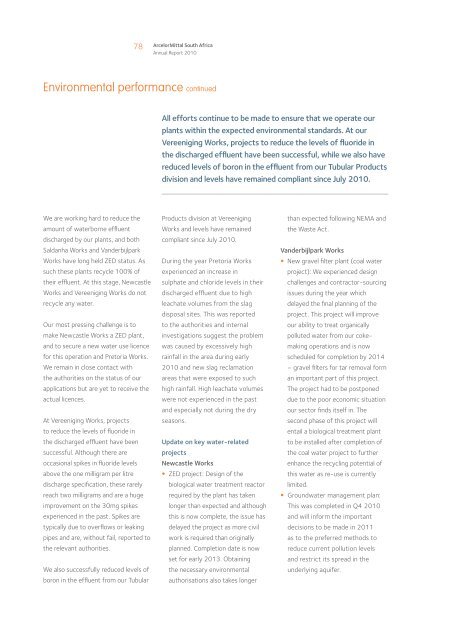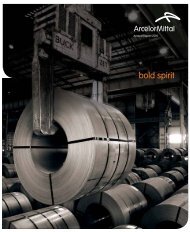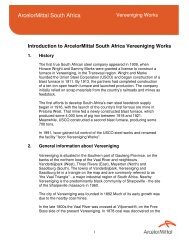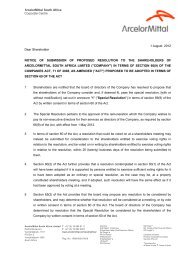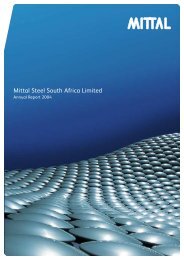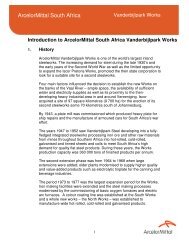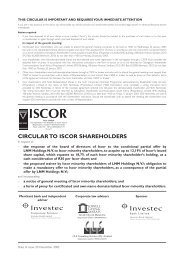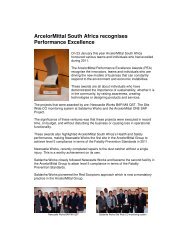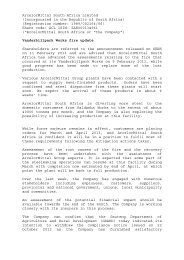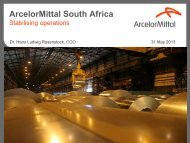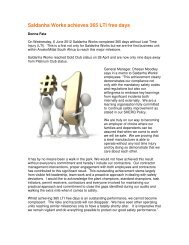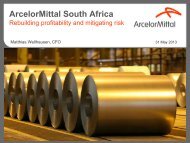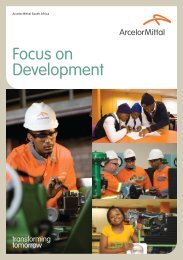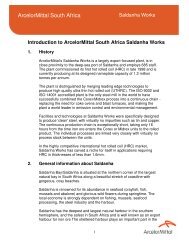bold spirit - ArcelorMittal South Africa
bold spirit - ArcelorMittal South Africa
bold spirit - ArcelorMittal South Africa
Create successful ePaper yourself
Turn your PDF publications into a flip-book with our unique Google optimized e-Paper software.
78<br />
<strong>ArcelorMittal</strong> <strong>South</strong> <strong>Africa</strong><br />
Annual Report 2010<br />
Environmental performance continued<br />
All efforts continue to be made to ensure that we operate our<br />
plants within the expected environmental standards. At our<br />
Vereeniging Works, projects to reduce the levels of fluoride in<br />
the discharged effluent have been successful, while we also have<br />
reduced levels of boron in the effluent from our Tubular Products<br />
division and levels have remained compliant since July 2010.<br />
We are working hard to reduce the<br />
amount of waterborne effluent<br />
discharged by our plants, and both<br />
Saldanha Works and Vanderbijlpark<br />
Works have long held ZED status. As<br />
such these plants recycle 100% of<br />
their effluent. At this stage, Newcastle<br />
Works and Vereeniging Works do not<br />
recycle any water.<br />
Our most pressing challenge is to<br />
make Newcastle Works a ZED plant,<br />
and to secure a new water use licence<br />
for this operation and Pretoria Works.<br />
We remain in close contact with<br />
the authorities on the status of our<br />
applications but are yet to receive the<br />
actual licences.<br />
At Vereeniging Works, projects<br />
to reduce the levels of fluoride in<br />
the discharged effluent have been<br />
successful. Although there are<br />
occasional spikes in fluoride levels<br />
above the one milligram per litre<br />
discharge specification, these rarely<br />
reach two milligrams and are a huge<br />
improvement on the 30mg spikes<br />
experienced in the past. Spikes are<br />
typically due to overflows or leaking<br />
pipes and are, without fail, reported to<br />
the relevant authorities.<br />
We also successfully reduced levels of<br />
boron in the effluent from our Tubular<br />
Products division at Vereeniging<br />
Works and levels have remained<br />
compliant since July 2010.<br />
During the year Pretoria Works<br />
experienced an increase in<br />
sulphate and chloride levels in their<br />
discharged effluent due to high<br />
leachate volumes from the slag<br />
disposal sites. This was reported<br />
to the authorities and internal<br />
investigations suggest the problem<br />
was caused by excessively high<br />
rainfall in the area during early<br />
2010 and new slag reclamation<br />
areas that were exposed to such<br />
high rainfall. High leachate volumes<br />
were not experienced in the past<br />
and especially not during the dry<br />
seasons.<br />
Update on key water-related<br />
projects<br />
Newcastle Works<br />
• ZED project: Design of the<br />
biological water treatment reactor<br />
required by the plant has taken<br />
longer than expected and although<br />
this is now complete, the issue has<br />
delayed the project as more civil<br />
work is required than originally<br />
planned. Completion date is now<br />
set for early 2013. Obtaining<br />
the necessary environmental<br />
authorisations also takes longer<br />
than expected following NEMA and<br />
the Waste Act.<br />
Vanderbijlpark Works<br />
• New gravel filter plant (coal water<br />
project): We experienced design<br />
challenges and contractor-sourcing<br />
issues during the year which<br />
delayed the final planning of the<br />
project. This project will improve<br />
our ability to treat organically<br />
polluted water from our cokemaking<br />
operations and is now<br />
scheduled for completion by 2014<br />
– gravel filters for tar removal form<br />
an important part of this project.<br />
The project had to be postponed<br />
due to the poor economic situation<br />
our sector finds itself in. The<br />
second phase of this project will<br />
entail a biological treatment plant<br />
to be installed after completion of<br />
the coal water project to further<br />
enhance the recycling potential of<br />
this water as re-use is currently<br />
limited.<br />
• Groundwater management plan:<br />
This was completed in Q4 2010<br />
and will inform the important<br />
decisions to be made in 2011<br />
as to the preferred methods to<br />
reduce current pollution levels<br />
and restrict its spread in the<br />
underlying aquifer.


